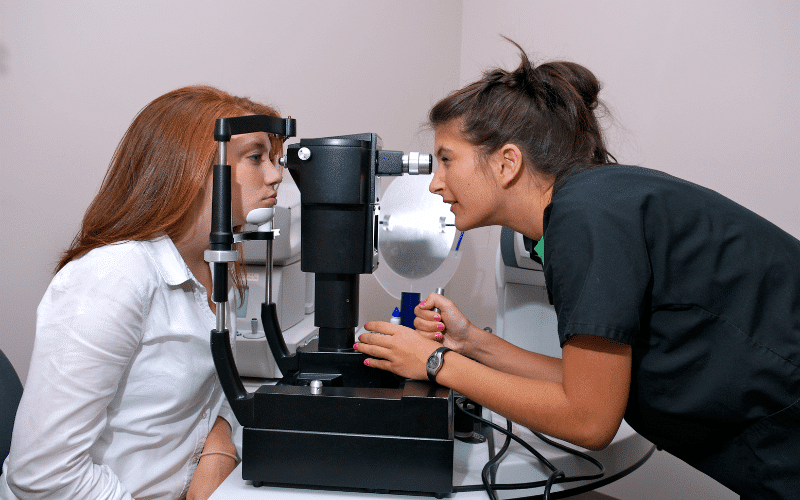FAQs about Eye Conditions and Diseases

1. How can I prevent eye conditions and diseases?
To maintain optimal eye health and prevent eye conditions and diseases, follow these tips:
- Have regular eye exams to detect and address any issues early.
- Maintain a healthy diet rich in fruits, vegetables, and omega-3 fatty acids.
- Wear sunglasses with UV protection to shield your eyes from harmful UV rays.
- Protect your eyes with safety glasses or goggles during sports or activities with a risk of eye injury.
- Manage chronic health conditions like diabetes and high blood pressure.
- Quit smoking, as it increases the risk of several eye diseases.
- Limit screen time and practice the 20-20-20 rule: every 20 minutes, look at something 20 feet away for 20 seconds.
2. How often should I have an eye exam?
The recommended frequency of eye exams depends on your age, risk factors, and whether you currently wear glasses or contact lenses. As a general guideline:
- Children should have their first eye exam between the ages of 6 months and 1 year, another one at age 3, and another before starting school. School-aged children should have an eye exam every 1-2 years.
- Adults aged 18-60 should have an eye exam every 1-2 years or as recommended by their eye care professional.
- Adults over 60 should have an annual eye exam.
If you have risk factors for eye diseases, such as a family history of eye conditions or a chronic health condition like diabetes, your eye care professional may recommend more frequent exams.
3. Can vision loss from eye diseases be reversed?
In some cases, vision loss from eye diseases can be partially or fully reversed with prompt intervention and treatment. However, for many eye conditions, such as glaucoma and advanced macular degeneration, vision loss is irreversible. Early detection and treatment are crucial to preserving vision and preventing further damage.
4. What are the most common symptoms of eye problems?
Common symptoms of eye problems can include:
- Blurry or distorted vision
- Eye pain or discomfort
- Redness or inflammation
- Sensitivity to light
- Floaters or flashes
- Dryness or excessive tearing
- Difficulty seeing at night
- A sudden change in vision
If you experience any of these symptoms, consult an eye care professional for an evaluation and appropriate treatment.
5. Can over-the-counter (OTC) eye drops help with eye conditions?
OTC eye drops can provide temporary relief for some eye conditions, such as dryness, redness, or itchiness. However, they are not a substitute for professional diagnosis and treatment. If you have persistent or worsening symptoms, consult an eye care professional to determine the cause and appropriate treatment options.
In conclusion, understanding the various eye conditions and diseases, their signs and symptoms, and preventive measures is essential for maintaining optimal eye health. Regular eye exams play a crucial role in early detection and treatment, allowing individuals to address any issues promptly and preserve their vision. Stay proactive about your eye health and consult an eye care professional if you experience any concerning symptoms.
6. Can wearing glasses or contact lenses weaken my eyesight?
Wearing glasses or contact lenses does not weaken your eyesight. They are prescribed by an eye care professional to correct vision problems such as nearsightedness, farsightedness, astigmatism, and presbyopia. Using the correct prescription can help you see more clearly and comfortably.
It’s essential to have regular eye exams to ensure your prescription remains up-to-date and continues to provide optimal vision correction. Not wearing your prescribed eyewear or wearing an incorrect prescription can strain your eyes, cause headaches, and worsen your vision over time.
Conclusion: Prioritizing Eye Health for a Clearer Future
In conclusion, understanding various eye conditions and diseases and their associated signs and symptoms is essential for maintaining good eye health. Adopting preventive measures and making lifestyle choices that promote eye wellness can go a long way in protecting your vision. Regular eye exams play a crucial role in the early detection and treatment of eye issues, allowing you to address any concerns promptly and effectively.
Being proactive about your eye health and following the advice of eye care professionals can help you preserve your vision and enjoy a better quality of life. By staying informed about the latest developments in eye care and sharing this knowledge with others, we can collectively contribute to a future where vision loss and eye diseases are minimized.
So, take charge of your eye health today and consult an eye care professional if you have any concerns or notice any changes in your vision. Together, we can work towards a clearer, brighter future for everyone.